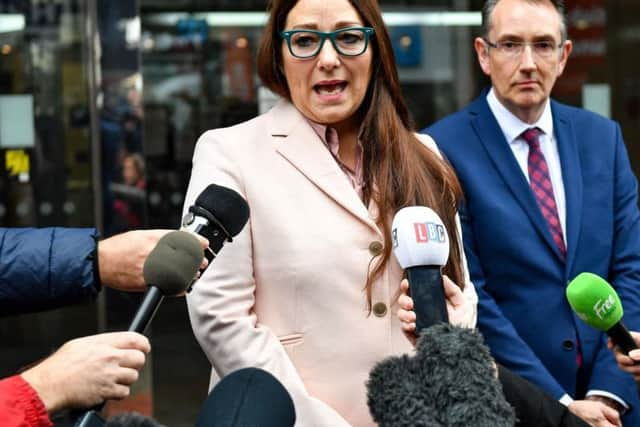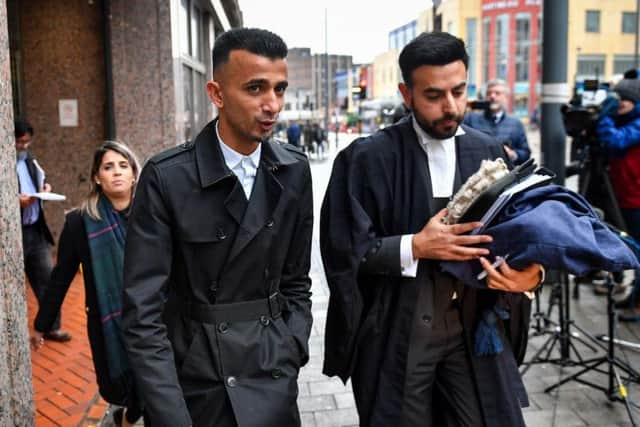Anti-LGBT teaching protesters claim "white bias" after school gates ban by judge
The ban, handed down at the High Court in Birmingham on Tuesday, includes a pre-existing exclusion zone surrounding the city's Anderton Park Primary School.
Head teacher Sarah Hewitt-Clarkson said she was "happy" after the ruling, telling reporters: "We will carry on doing what we do."
Advertisement
Hide AdAdvertisement
Hide AdThe Department for Education and the city council also welcomed the judge's decision.


The legal bid had been opposed by protesters, along with an interim ban first granted at the same court in the summer.
Immediately after the ruling, protester Shakeel Afsar branded the court "one-sided", pointing out that the judge, the council's barrister and key witnesses had been "white", compared with the "diverse" protest supporters.
Speaking at a press conference, he vowed that protests - outside the exclusion zone - would be continuing but was "bitterly disappointed" with the case's outcome.


Another lead protester, Amir Ahmed, signalled the ruling would be appealed against.
Birmingham City Council was granted an order temporarily banning protesters from outside the school's gates in June, over safety fears about repeated large-scale demonstrations, often involving people with no direct connection to the school.
The injunction was made against three individuals - the protest's main organisers Mr Afsar, Mr Ahmed, and parent Rosina Afsar, as well as "persons unknown".
Christian campaigner John Allman, from Okehampton, Devon, had also opposed the legal bid, claiming it limited public protest.
Advertisement
Hide AdAdvertisement
Hide AdMrs Hewitt-Clarkson had previously described the demonstrations as "awful", "toxic and nasty", and has spoken of receiving threats as a result of the gatherings.
Mr Afsar repeatedly claimed the weekly demonstrations, held just yards from classrooms and featuring megaphones and a sound-boosting PA system, were "peaceful".
The self-styled businessman, who has no children himself at the school, claimed protests were only triggered because the head teacher had not properly consulted parents about relationships teaching.
He had argued education material used was not age appropriate, and further claimed the school was "over-emphasising a gay ethos".
Mrs Hewitt-Clarkson rejected the claims, saying the material was appropriate and great care had been taken in how children were taught about different relationships.
She also told the judge, giving evidence at the injunction's trial, that parents had had "numerous informal and formal chances to speak to us as a school" about any concerns.
But describing a private meeting she had with Mr Afsar in her office, she said: "He slammed his hand on my desk. He used the word 'demand'... It was volatile, it was aggressive.
"I had never had a meeting like that before in 26 years of teaching.
Advertisement
Hide AdAdvertisement
Hide Ad"He set up a WhatsApp group that afternoon ... trying to whip up a frenzy."
Mr Justice Warby QC, handing down the permanent injunction at the High Court in Birmingham, said the protests had "a very significant adverse impact on the pupils, teachers and local residents".
Recounting claims made by speakers at the protests, including one that the school had a "paedophile agenda" and that staff were "teaching children how to masturbate", the judge said: "None of this is true."
He added: "None of the defendants have suggested it was true and the council has proved it is not true."
Imposing the injunction, he said: "The court finds on the balance of probabilities the defendants bear responsibility for the most extreme manifestations (of the protest)."
The injunction does not include an earlier ban on use of social media to abuse teaching staff.
The judge also awarded the council 80% of the costs of bringing the case, deducting a proportion because part of the claim - for an injunction on the making of abusive social media posts against teachers - had been unsuccessful.
Afterwards, Mrs Hewitt-Clarkson said: "When people say things about you that are not true, that is very difficult.
Advertisement
Hide AdAdvertisement
Hide Ad"It has taken us to come to the High Court to clear that up."
She added: "We are particularly thrilled that the school has not been criticised at all in anything the judge has said."
Mr Afsar said: "I do regret to say that I feel the court's approach in their case has been very one-sided."
Concluding his remarks, Mr Afsar drew comparison between the "diverse group of people coming together for one cause" in support of the protesters, and others in court.
Mr Afsar said: "Yet when you look at those representing the council and the court, compare faces and backgrounds.
"The judge is white, the council's barrister is white, the council's legal team is white, the teachers who gave evidence were white, the witnesses who gave evidence for the council were white.
"The councillors who misrepresented their voters were white, the police officers who presented witness statements for the council were white."
He added: "A lack of impartiality is unfair and when unfairness affects justice that in itself is injustice."
